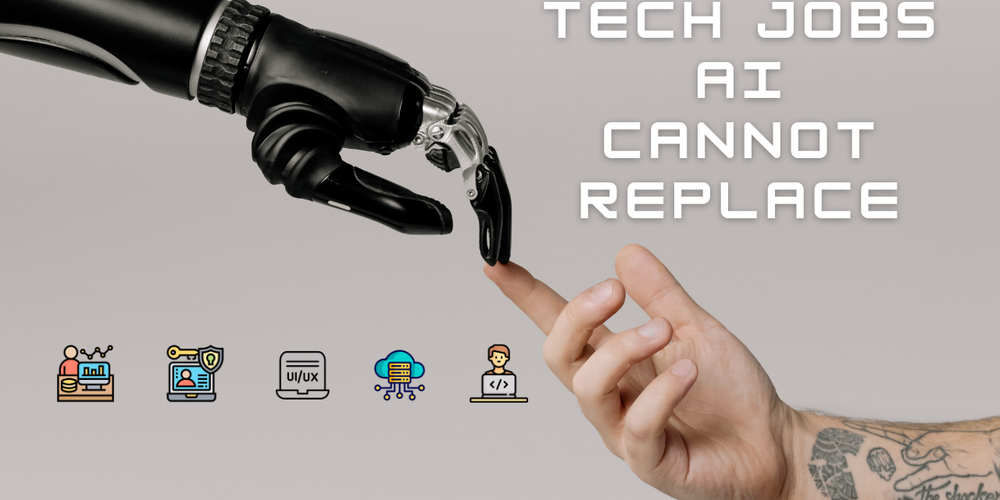Is Your Job Safe from AI? Unveiling the 6 Irreplaceable Roles
-
 Rohan Dua
Rohan Dua
- Sep 4, 2023
-
 Tech Culture
Tech Culture
- 04 Mins read

The rise of Artificial Intelligence (AI) has transformed industries and reshaped the job market. Automation and AI-powered systems have made some tasks more efficient, but there are certain roles where human expertise remains irreplaceable. In this article, we explore six such jobs that AI cannot replicate due to their unique human elements.
As we delve into the irreplaceable roles in today's job landscape, it's also essential to consider the future. We recommend watching our video, 'Jobs that will become obsolete by 2030 [REVEALED],' to gain insights into the changing job market and which roles might face challenges in the coming years.
Now, we will have a look at the jobs that are safe from AI -
1. Data Scientist: Mastering the Art of Data
While AI can manage data, it takes a human touch to understand and interpret it strategically.
Data scientists are the architects of insights, deciphering complex data sets to extract meaningful conclusions. AI can process data at incredible speeds, but it lacks the human ability to grasp the intricacies, nuances, and context behind the numbers. Data scientists not only develop algorithms but also frame the right questions, interpret results, and provide actionable recommendations. Their blend of analytical thinking and domain knowledge remains indispensable in decision-making processes across various industries. A study conducted by the renowned Massachusetts Institute of Technology (MIT) highlights the pivotal role of data scientists in bridging the gap between raw data and actionable business intelligence.
2. Cyber Security Expert: Guardians of the Digital Realm
AI can predict threats, but only a qualified professional can build and maintain a secure network architecture.
As AI evolves, so do cyber threats. While AI can analyze patterns and detect potential breaches, it's the human-driven approach of cyber security experts that fortifies digital landscapes. These professionals design, implement, and manage robust security systems, staying one step ahead of cybercriminals. They understand the dynamic nature of cyber threats, adapt to new attack techniques, and ensure data integrity, privacy, and compliance. According to a report by the Cybersecurity and Infrastructure Security Agency (CISA), human expertise is paramount in understanding the intricacies of constantly changing cyber threats.
3. Software Development Manager: Orchestrating Creativity
AI can support in coding but cannot match the creative aptitude or leadership required for successful software development.
Software development is a creative process as much as it is technical. While AI can automate some coding tasks, it cannot replace the creativity and problem-solving abilities of software development managers. These leaders guide teams, make critical decisions, and ensure that software aligns with business goals and user needs. The human touch in software development is essential for innovation, envisioning new features, and steering projects towards success. A study published in the Harvard Business Review emphasizes the critical role of software development managers in providing direction, fostering collaboration, and guiding teams towards success.
4. Cloud Architect: Navigating Complexity
Cloud Management is complex that requires human insights and decision making.
Cloud architecture is the backbone of modern technology infrastructure. AI can assist in managing resources, but cloud architects bring a unique blend of technical expertise and strategic vision. They evaluate business needs, make informed decisions on cloud services, and design scalable, resilient systems. The intricate interplay of various components in cloud environments demands human insights for optimization and security. A research paper by Gartner, a leading technology research and advisory company, underscores the significance of human architects in navigating the complexities of cloud environments.
5. UI-UX Designer: Crafting User-Centric Experiences
Human element in design and understanding user behavior and emotions is something AI is yet to master.
User Interface (UI) and User Experience (UX) design require a deep understanding of human behavior, emotions, and preferences. While AI can automate design to some extent, it struggles with creating experiences that resonate with users on an emotional level. UI-UX designers focus on making technology intuitive, enjoyable, and accessible, ensuring that digital products connect with users on a personal level. According to a usability study conducted by the Nielsen Norman Group, UI-UX designers play a pivotal role in creating intuitive and visually appealing interfaces that resonate with users on a personal level.
6. Technical Programme Manager: Orchestrating Innovation
Coordinating resources, managing timelines, and linking various tech teams needs nuanced touch.
In the complex realm of tech projects, technical programme managers play a pivotal role. They act as conductors, synchronizing the efforts of multiple teams, managing timelines, and aligning projects with organizational objectives. AI can assist in project management, but the human element, including negotiation, problem-solving, and understanding team dynamics, remains essential for success. A report by the Project Management Institute (PMI) highlights the indispensable role of human programme managers in providing strategic vision, resolving conflicts, and aligning all elements for a cohesive tech outcome.
Conclusion
In conclusion, while AI continues to advance, there are jobs where human intelligence, creativity, and empathy are irreplaceable. Data scientists decode data, cyber security experts safeguard our digital lives, software development managers steer innovation, cloud architects navigate complexity, UI-UX designers craft user-centric experiences, and technical programme managers orchestrate innovation. As technology evolves, these professions not only remain relevant but also showcase the enduring value of human expertise in an increasingly automated world.
